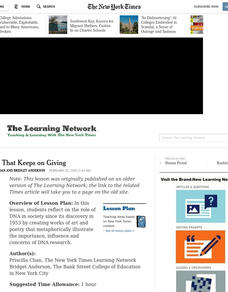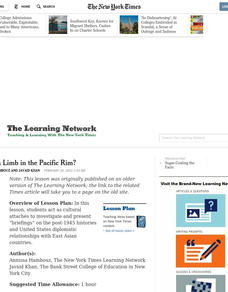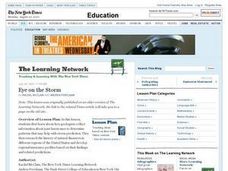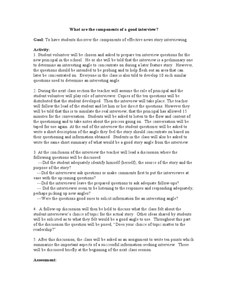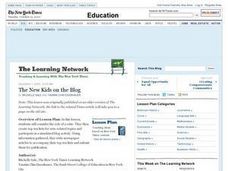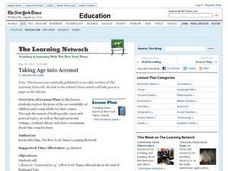Curated OER
Modern Conditions Placed on Traditions
Students explore the role of traditions in world cultures. They read a New York Times article dealing with recent changes in the traditional clothing worn in England's House of Lords
Curated OER
Read On
Students consider the question "Why do we read?" through creating and sharing individual timelines of their own histories as readers. They then choose a book on which to write a personal essay.
Curated OER
Swinging on a Star
Students explore the issues that might arise if humans were to go on an interstellar space mission. They synthesize their understanding of interstellar travel by writing scenes from a science fiction novel that would depict such a mission.
Curated OER
Eyes Worldwide on the Prize
Students examine Martin Luther King, Jr.'s "I Have a Dream" speech and see how it has been produced in China by reading an online article. They study discrimination in the world and write responses to the speech.
Curated OER
The Gift That Keeps on Giving
Students reflect on the role of DNA in society since its discovery in 1953 by creating works of art and poetry that metaphorically illustrate the importance, influence and concerns of DNA research.
Curated OER
Look on the Bright Side!
Students explore solar eclipses by participating in a number of hands-on activities. In class, students work in teams using tennis balls, grapes and flashlights to model partial and total solar eclipses.
Curated OER
Out On A Limb In The Pacific Rim?
Students act as cultural attachés to investigate and present briefings on the post-1945 histories and United States diplomatic relationships with East Asian countries. They articulate their foreign policy findings.
Curated OER
Drawing on Terror
Students assess the ways in which editorial cartoons offer insight into events that shape our world, specifically focusing on the September 11, 2001 terrorist attacks on the United States.
Curated OER
Eye on the Storm
Young scholars discover the way geologists collect information about past hurricanes to determine patterns that may help with storm prediction. They then research the history of natural disasters in different regions of the United States...
Curated OER
Taking Them On Faith?
Learners explore, examine and study about the role of religion in presidential campaigns and elections by reading and discussing the article, "God" 08: Whose, and How Much, Will Voters Accept?" They research a variety of presidents...
EngageNY
Researching about the Red Cross, Continued: How Did the Red Cross Aid Haiti After the 2010 Earthquake?
What a puzzle! Scholars participate in a Jigsaw discussion within their expert groups, determining the gist of an article about the 2010 Haiti earthquake. As they read and discuss the article, they record thoughts on their note catchers.
Curated OER
Don't Believe the Hype
Are hand sanitizers good for you? What about the environment? Research the science behind commonly used cold medicines. The class reads an article, creates a product poster, and conducts independent research on product claims made by...
Curated OER
The Noughties
Take a look back at a decade your class will actually remember: the noughties. Guide discussion about events your class recalls from those years, and then have them analyze an article (included). Although not specified, learners need to...
National Endowment for the Humanities
Chronicling America: Uncovering a World at War
As part of a study of World War I, class members read newspaper articles from the time that urge American involvement, non-involvement, or neutrality. Using the provided worksheet, groups analyze the articles noting the central argument...
Facing History and Ourselves
Verifying Breaking News
The attempts of journalists to verify the events surrounding the shooting of Michael Brown take center stage as individuals analyze three of the initial newspaper accounts of the story. The whole class discussion then focuses on the...
Curated OER
What are the Components of a Good Interview?
Class members develop interview questions and then one volunteer interviews a new principal (the instructor) while the entire class watches and takes notes. Participants then individually consider an interesting angle from which the...
Curated OER
Presidents
Fifth graders use almanacs to take notes on their individual presidents on a note card. They fill in a variety of biographical information on their president. They convert their information into whole paragraphs.
Curated OER
They're Tilling that Field Behind the Mall
Unfortunately, the article for which this resource was written is not available. You can, however, find another current document on agriculture and urban development for your class to read together, and then still follow the suggested...
Curated OER
The New Kids on the Blog
Learners consider the role of a critic by creating top ten lists for arts-related topics and participate in a simulated blog activity. They write newpaper articles to accompany their top ten lists and submit them for publication.
Newseum
Evidence: Do the Facts Hold Up?
Sometimes it's hard to escape bad information! Pupils learn the E.S.C.A.P.E. method for evaluating news sources and complete a worksheet to assess a news article using their new skills.
Curated OER
Taking Age into Account
Have your class consider the issue of minors' accountability for their crimes. They discuss specific cases and the general issue of juvenile crime in round table discussions. Use this lesson to emphasize the rules and individual roles...
Newseum
E.S.C.A.P.E. Junk News
Fair, balanced, and reputable information? There's an acronym for that! Scholars learn the E.S.C.A.P.E. method for evaluating news sources. Then, pupils work in small groups to read and analyze a news story and discuss the activity to...
Curated OER
A Discourse on the History of Language
Analyze and make inferences from the information used by linguists to construct the evolution of languages. They research different dating techniques to explain how scientists infer age with evidence.
Scholastic
Ready to Research Owls
Researching facts about owls can be a hoot for your class. Let them wisely collaborate on this writing project. The resource is the second part of three parts. It is best to use all three lessons in order.






